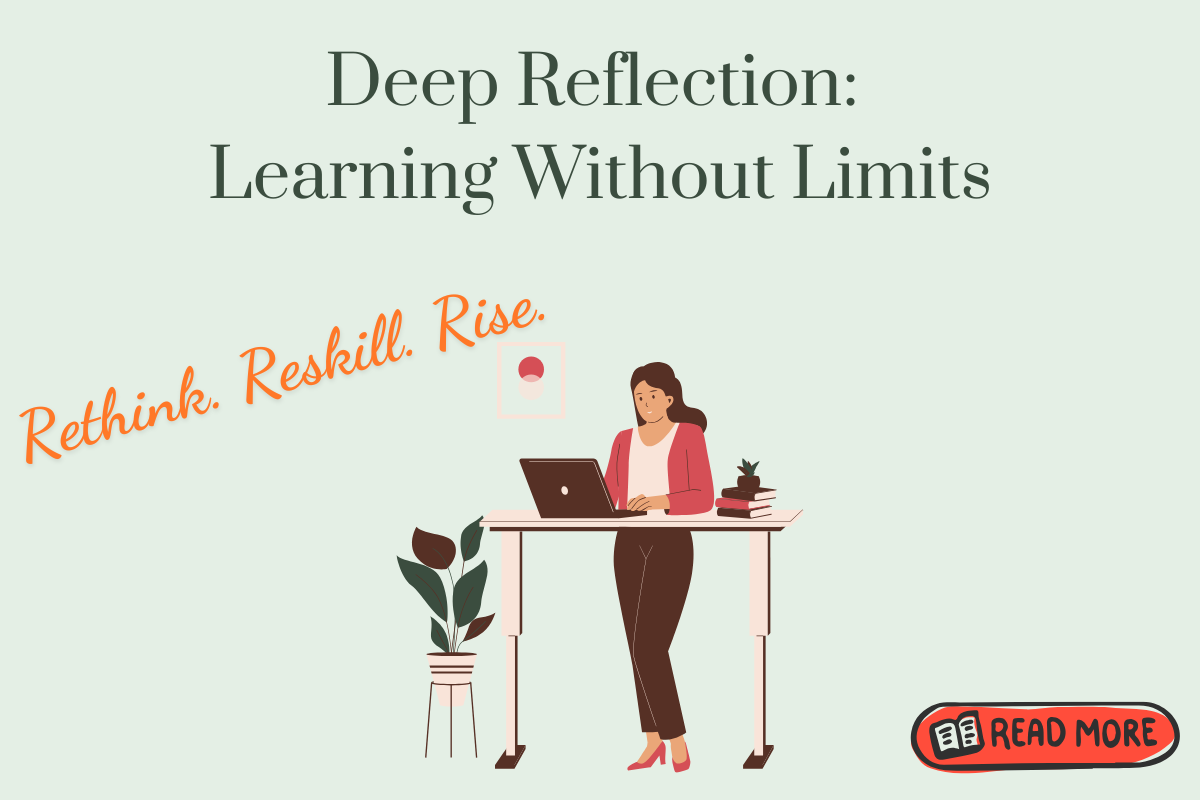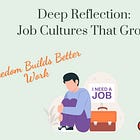Deep Reflection Series 2.19 – Reinventing Educational Pathways #WorkCulture
Redesigning Education for the Workforce of Tomorrow

🖌️ In our previous reflection on the changing nature of work, we explored how automation, decentralised teams, and skills-based hiring are reshaping the future workforce. As job structures evolve, so too must the ways professionals build and adapt their skills.
For decades, traditional pathways such as four-year college degrees have been regarded as the “gold standard” of education. But as industries transform and technology accelerates, this one-size-fits-all approach no longer meets the needs of today’s workforce, especially for those already employed and looking to grow within their roles.
For professionals seeking to evolve in their current positions, staying ahead requires rethinking how and where they learn. Traditional systems are no longer fast enough to keep pace. Whether aiming to step into leadership, shift responsibilities, or deepen their impact, individuals now have access to learning models that offer real-time, practical pathways for growth.
We are entering the era of reinvented educational pathways. Bootcamps, online certifications, micro-credentials, and experiential learning are reshaping how people acquire knowledge. These alternatives redefine education not as a phase, but as a lifelong partnership between learning and doing. This chapter focuses on how professionals can access these models to stay relevant, empowered, and engaged in a rapidly shifting work environment.
Why Traditional Education Falls Short
Traditional educational systems were designed during an industrial age when rote memorisation, standardised testing, and rigid credentials supported the needs of large-scale, factory-style economies. However, the demands of the modern workforce have rendered many of these conventions outdated.
1. A Skills Gap in a Rapidly Changing World
Employers increasingly emphasise skills over degrees, seeking candidates who can solve problems, adapt to technology, and collaborate across teams. Unfortunately, traditional college curriculums often struggle to keep pace, leaving graduates with knowledge that is either too theoretical or already outdated. Fields such as programming, data science, and digital marketing evolve so quickly that by the time students graduate, their skills may already require upgrading.
Many working professionals now face this gap mid-career, realising that the credentials they once relied on no longer match the demands of their evolving roles.
2. High Costs, Limited Accessibility
For many, a college degree is prohibitively expensive. Rising tuition fees and student debt have created barriers that prevent millions from accessing education equitably. This financial burden disproportionately affects underprivileged communities, creating a cycle where opportunity is closely tied to privilege.
Even for employed individuals, returning to traditional education can feel financially and logistically impossible. This prompts the search for more flexible alternatives.
3. The Misalignment Between Education and Jobs
The traditional model often assumes that education ends once employment begins. In reality, however, the job market rewards those who continue learning. Lifelong learning is no longer a supplement but a necessity. Academic institutions that do not collaborate with industries remain disconnected from what employers and employees truly need.
For today’s workforce, especially those who want to grow without leaving their current positions, learning must happen alongside working, not in isolated phases.
The Rise of Alternative Education Models
Fortunately, new educational pathways are emerging to address the shortcomings of traditional systems. These alternatives do not replace formal education but complement it, offering tailored solutions for today’s fast-changing labour demands and for professionals who need learning that fits into their existing careers.
1. Bootcamps for Accelerated Learning
Coding bootcamps, design sprints, and trade-specific programs are reshaping how people gain technical skills. These intensive, short-term programs often emphasise real-world applications and job readiness. For instance, tech bootcamps such as General Assembly and Flatiron School have helped launch countless new careers in programming, UX design, and data science.
Their appeal lies in their focus. Learners gain highly specific expertise without spending years in school, and many bootcamps collaborate directly with employers to support placement.
Take the case of Aisha, a customer service team lead who completed a data analytics bootcamp while working full-time. Within six months, she transitioned into a newly created analytics role within her department, proving that internal growth does not always require a new job, just new skills.
2. Online Certifications and Micro-Credentials
Platforms such as Coursera, Udemy, and LinkedIn Learning offer flexible learning options that allow professionals to earn certifications in areas like project management, artificial intelligence, or graphic design. Micro-credentials and stackable certificates enable learners to build competencies incrementally and showcase their skills immediately.
This model is particularly valuable for professionals who want to continue learning without leaving their jobs. Certifications like Google’s IT Support Professional Certificate or AWS programs are now widely recognised as credible indicators of ability.
3. Experiential Learning
Learning by doing has proven to be one of the most effective ways to develop lasting skills. Apprenticeships, internships, and cooperative education programs bridge the gap between theoretical knowledge and practical application. Programs such as Year Up combine technical training with real-world corporate experience, helping underrepresented young adults enter high-growth industries with confidence.
Entrepreneurial projects, side ventures, and volunteer work also fall into this category. These experiences teach people to adapt, solve problems, and innovate in ways that cannot be simulated in a classroom.
Even within full-time roles, employees who take on stretch assignments, lead internal projects, or shadow colleagues in other departments engage in this form of experiential learning.
4. Lifelong Learning Ecosystems
The outdated idea of education as a phase with a beginning and end is steadily being replaced by a mindset of continuous learning. Employers and educators alike now support ongoing skill development through training programs, online modules, and professional development opportunities.
Building Education for the Future
Reinventing educational pathways calls for meaningful collaboration among individuals, institutions, and industries. Here is how we can create a more adaptive system that supports professional growth at every stage of life.
1. Learners Must Take Ownership
Success in this environment demands active engagement. Professionals must stay curious, cultivate discipline, and seek opportunities to grow their skills.
Actionable Advice for Learners:
• Identify in-demand skills in your field and begin acquiring them through online courses or bootcamps
• Build a portfolio of real-world projects that highlight your expertise, especially in creative or technical domains
• Make learning part of your routine by attending webinars, joining workshops, or reading industry publications
Reflective Prompt:
What is one skill you have been meaning to learn that could elevate your impact in your current role?
2. Institutions Must Align Education with Industry
Universities and training centres must evolve. Static curriculums and inflexible degree structures no longer serve today’s workforce. Collaboration with industry, modular learning formats, and experiential training should become central elements of education.
Actionable Advice for Institutions:
• Co-create practical courses or certification programs with industry partners
• Offer learners flexible, stackable credentials that fit around their professional lives
• Expand learning access by offering evening sessions or fully remote programs suited to working adults
3. Employers Must Champion Lifelong Learning
Professional development must become a strategic priority for employers. Investing in employee growth builds engagement, agility, and long-term performance.
Actionable Advice for Employers:
• Give employees access to learning platforms and support them in gaining recognised certifications
• Develop mentorship or internal apprenticeship programs that foster skill-building and cross-functional growth
• Focus hiring and promotion decisions on demonstrable skills, not just academic backgrounds
4. Policymakers Must Promote Access and Equity
Governments have a critical role to play in ensuring education is affordable, flexible, and inclusive. Reducing student debt, expanding funding for skills programs, and broadening access for underserved communities are vital steps toward this goal.
A Vision for an Empowered Future
Imagine an education system where access is based on potential, not privilege. A world in which anyone, regardless of background, can gain the tools and experiences needed to succeed. By removing the boundaries between learning and working, we create a society that values knowledge as a lifelong pursuit, not a front-loaded prerequisite.
The future of education is already unfolding. It is flexible, inclusive, and aligned with real-world needs. It merges structured learning with applied experience, empowering individuals to grow not only as employees, but as thinkers, problem-solvers, and contributors to a better future.
What’s Next?
Now that we’ve explored how individuals can take control of their learning, our next reflection turns to the environments that make that growth possible.
Innovating Workplace Cultures will examine how forward-thinking organisations foster creativity, well-being, and human potential, ensuring that professional growth is not just an individual pursuit but a cultural priority.
👉 Follow ThinkZeit on Substack and tap the bell 🛎️ to stay connected without chasing noise. If this reflection made you pause, share it with someone who reads quietly but deeply.
—#WorkCulture— by Ellis Zeitmann for ThinkZeit
#WorkCulture #HiringParadox #EmployeeExperience #CareerGrowth #WorkplaceSurveillance #HRGhosting #AlgorithmicBias #DigitalPrivacy #ModernWorkplace #DeepReflections



